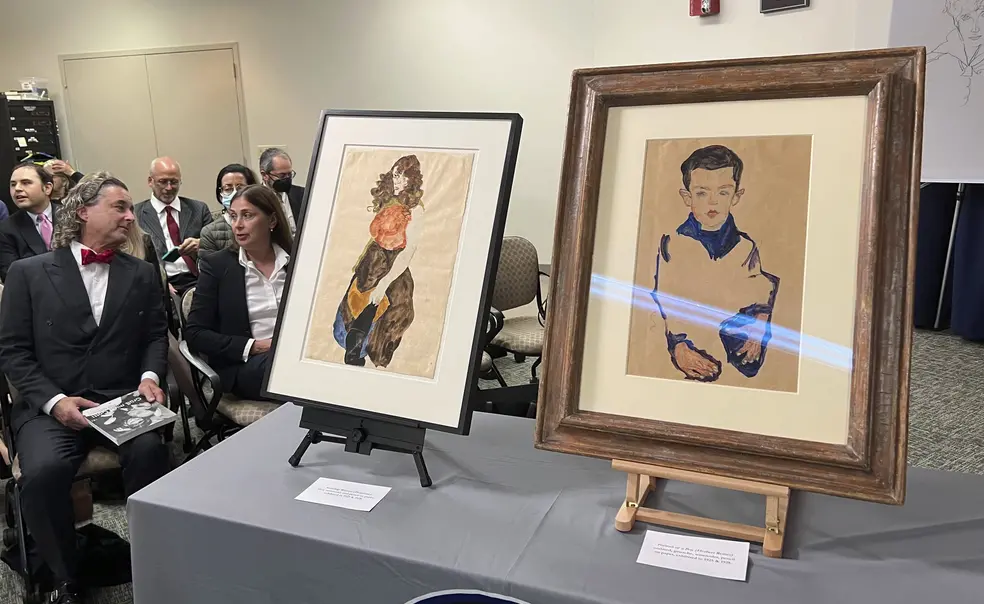Artworks Stolen by Nazis Returned to Timothy Reif ’80 *85 and Family
The seven paintings by Austrian Egon Schiele had been owned by renowned cabaret performer Fritz Grünbaum.
Some eight decades after the Nazis killed one of his ancestors and more than a decade after launching a legal battle, Timothy Reif ’80 *85 and his family have taken possession of seven paintings by the celebrated Austrian painter Egon Schiele that had been owned by their family until they were stolen by the Nazis.
On Sept. 20, Manhattan District Attorney Alvin Bragg, flanked by other law enforcement officials and Rief, handed over seven paintings that had been relinquished by the Museum of Modern Art, the Morgan Library & Museum, the Santa Barbara Museum of Art, and private collectors Serge Sabarsky and Ronald Lauder.
Bragg, whose office had asserted jurisdiction because the seven works had at one time been in the possession of a Manhattan-based dealer, called the return of the paintings “historic and groundbreaking” and praised Reif’s lengthy legal battle.
Standing between five of the seven paintings at a news conference, Reif applauded Bragg “for taking the right side of history” and said the return of the artworks “reminds us once again that history’s largest mass murder has too long concealed history's greatest robbery.”
The paintings had been owned by Fritz Grünbaum, a renowned cabaret performer, songwriter, and director in pre-World War II Vienna who is believed to have been an inspiration for the Joel Grey character in the Broadway musical and film adaptation of Cabaret.
Grünbaum, the first cousin of Reif’s paternal grandfather, moved in artistic circles, ultimately collecting several hundred artworks, including an estimated 70 by Schiele; many have vanished into the historical mists. That’s because when the Nazis invaded Austria in 1938, Grünbaum — a critic of the Third Reich and a Jew — tried to flee, but he was recognized, arrested, and sent to Buchenwald and then Dachau, where he died in 1941. After Grünbaum’s wife died the following year, also in a concentration camp, the collection vanished.
Reif told PAW that the return of the paintings was especially poignant coming in the period between the Jewish holy days of Rosh Hashanah and Yom Kippur.
Reif said in the interview that it was “chilling to think that the last time the works were all together, in his possession or that of his family, was in his apartment in 1938 when he was arrested and deported to Dachau.”
Reif, who is now a judge at the Court of International Trade in New York City, and his allies won their first victory in 2014, when a Schiele watercolor, Town on the Blue River, was sold by the Christie’s auction house under an acknowledgment that Grünbaum was a previous owner, with a share of the proceeds reserved for his heirs.
In 2019, a New York trial court ruled in favor of Reif’s family and against a London art dealer who had claimed ownership of some works. Then, in 2022, the New York Court of Appeals upheld the lower court’s decision, 5-0. Justice Anil Singh wrote, “We reject the notion that a person who signs a power of attorney in a death camp can be said to have executed the document voluntarily. ... Any subsequent transfer of the artworks did not convey legal title.”
This court victory helped give a legal basis and momentum to the Manhattan DA’s investigation. Bragg’s office was able to convince the owners of the seven works to return them. Earlier this month, the office used the same legal basis to seize works by Schiele that had been held by the Art Institute of Chicago, the Carnegie Museums of Pittsburgh, and the Allen Memorial Art Museum at Oberlin College. Continued litigation is expected for these works.
Reif’s family has pledged to donate their share of expected proceeds from an auction at Christie’s in New York to a foundation established in Grünbaum’s memory in 2022, the Grünbaum Fischer Foundation. The foundation will support young artists and freedom of expression in underserved communities — principles that Grünbaum cherished, Reif told PAW in 2022. The first award has been made to Edwin Miranda, a recent high school graduate who is studying jazz piano.
The works returned this week are valued between $780,000 and $2.75 million each, according to the New York Times.
Grünbaum had more than 400 artworks at the time of his arrest, including 81 by Schiele. “We have confidence that the District Attorney’s ongoing criminal investigation will uncover additional artworks,” Reif said.
At the press conference, Reif urged listeners that when viewing these artworks, they should “imagine Fritz and Elizabeth in their lively Vienna apartment, singing, dancing and cracking jokes. Remembering their lives defeats Hitler’s plan to erase this brave Jewish man’s name from the book of history.”










No responses yet